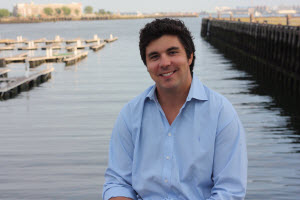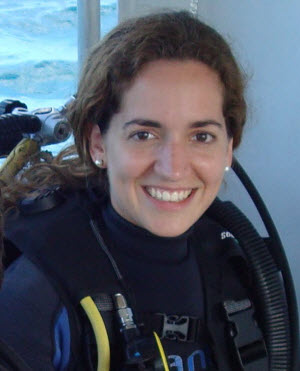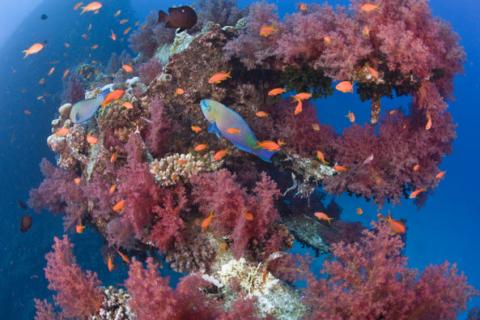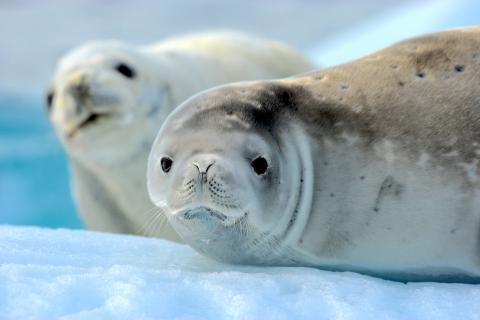Fostering Stewards of the Sea through Research
The health of our ocean relies on motivated sea stewards. Ocean First Education invests in early career scientists by awarding grants to support their research and conservation goals. Ocean First Education is currently supporting five young scientists located around the world who are conducting important work in several areas of marine science. Follow them on social media and look for their research updates on our blog.
-
-
Austin Gallagher (Miami, FL)
Study Location: Japan
Research Topic: Our hammerhead project is all about connections. Scalloped hammerhead sharks are an iconic, top marine predator that play a vital, regulatory role in their ecosystem. However, the highly lucrative trade of shark fins is at the heart of the crisis facing pelagic shark populations globally. Export to East Asia has been and continues to be a strong driver of this trade and is to a degree perpetuated by a lack of education surrounding marine conservation issues and general understanding of marine stewardship. Furthermore, the Japanese shark population remains unprotected. A marine reserve focused on the spatiotemporal patterns of this aggregation would be a huge conservation success. However, the implementation of this management tool is precluded without a better baseline understanding of the biological and ecological dynamics of the population. This project therefore will utilize powerful telemetry technology and new analytical techniques to monitor and understand the social and spatial patterns of this newfound aggregation. This project provides a unique and unprecedented opportunity to connect cultures and gather baseline data on a population of endangered pelagic sharks about which nothing is currently known.
Twitter: @predatorscience
Instagram: @predatorscience
Facebook: Austin Gallagher -
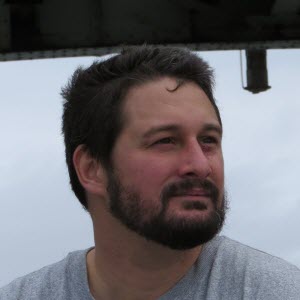
-
Andrew Thaler (Haynes, VA)
Study Location: Gloucester Point, VA
Research Topic: Our project is to buy the initial equipment and support of a pilot project to better integrate low-cost robotic platforms, such as drones and remotely operated vehicles (ROVs), into marine science and conservation programs in the Chesapeake Bay. Long term, this program will seek to expand the safe and responsible use of robotic assets in Chesapeake Bay research programs by providing support, training, and equipment to research and conservation programs. By providing technical expertise and robotic assets, this will reduce the cost and training time for new projects that want to add drones or ROVs to their research programs and will minimize barriers to entry for new drone and robotics users.Through innovative outreach projects, this program will also provide educational experiences for K – 12 students. The Girls and Grads Underwater Robot Camp will provide a marine science and mentorship experience for high school students. This program will introduce the tools and technologies to young scientists who want to explore potential STEM careers and help connect the general public to their marine environment. Informal education and outreach projects will also be developed to share ROV and drone assets with local citizen science groups.
Twitter: @SFriedScientist
Google+: Andrew David Thaler
Facebook: Andrew David Thaler -
-
Kerstin Forsberg (Lima, Peru)
Study Location: Northern Peru
Research Topic: Filling knowledge gaps and articulating socio-economical, biological, and fisheries considerations is imperative for conservation and management. The wider aim of this project is thus to provide a biological, fisheries, and socio-economic assessment of sharks and rays in northern Peru, with particular emphasis on poorly-studied commercially-exploited species (Alopias vulpinus, Sphyrna zygaena, Mobula spp., Myliobatis peruvianus, Squatina californica). Specific objectives will be to evaluate catch and effort in the shark and ray fisheries in northern Peru, record the distribution and reproductive state for each species, and evaluate the market dynamics of sharks and rays in northern Peru by documenting the wholesale and retail sale of sharks and rays, the main retail areas, and the seasonality, utilization, and prices of these species. By carrying out this multi-disciplinary assessment, this project aims to contribute to the effective conservation and fisheries management of sharks and rays in Peru; and provide a timely model that could also be replicated for other species or geographical areas.
Twitter: @planetaoceano
Instagram: @planetaoceano
Facebook: Planetaoceano -
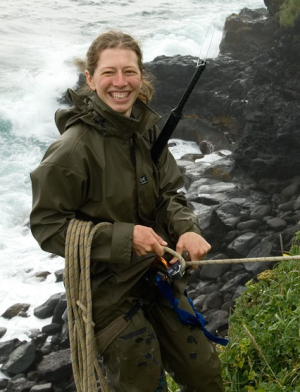
-
Rachael Orben (South Beach, Oregon)
Study Location: St. George Island, Alaska
Research Topic: Our project will identify critical foraging areas and prey of red-legged kittiwakes. This will be achieved via the use of miniature GPS dataloggers and tracking 10 red-legged kittiwakes during their pre-lay trips. Potential prey will be determined via stable isotope analysis of blood samples. This techniques looks at the unique chemical signature that each prey item has and is absorbed into the blood stream. Fieldwork will take place on St. George Island in the southeastern Bering Sea, where 70-80% of red-legged kittiwakes breed. This will be the first time this species is tracked during the pre-breeding stage.
Twitter: @RachaelOrben
Facebook: Rachael Orben -
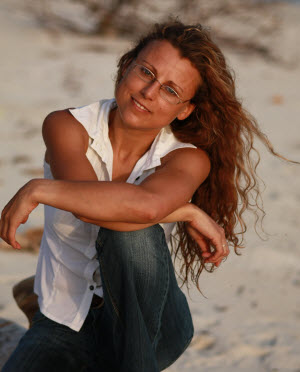
-
Dr. Sonia J. Rowley (Honolulu, Hawaii)
Study Location: Micronesia
Research Topic: Twilight reefs, those that are below about 50m deep, are among the greatest unexplored realms on the planet, hosting a wealth of scientific discovery and fascination. In an era necessitating resource subsistence and protection, particularly on low-lying atolls throughout the Pacific, this project aims to explore the undescribed Twilight reefs of Pakin atoll using advanced, electronically-controlled rebreather technology. With close community and institutional collaborations, coupled with the powerful lens of social media, this project endeavors to discover, disseminate, and involve local, general, and scientific communities alike.
Twitter: @SoniaJRowley
Facebook: Sonia Rowley
